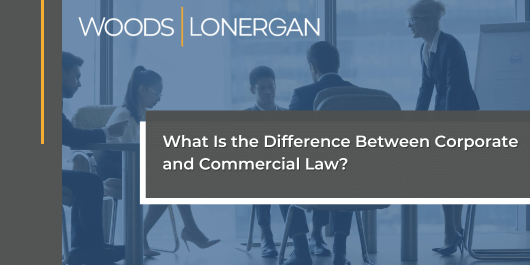
Corporate and commercial law are similar legal fields that deal with businesses and their operations. If you are searching for a lawyer to help with business matters, you may wonder about the difference between the two.
In short, corporate law deals with business governance, while commercial law deals with business activities—corporate law relates to how a business operates, and commercial law relates to what a business does.
Knowing the difference between corporate and commercial law allows you to make the most of your time with a corporate or commercial attorney. To speak with a knowledgeable, experienced attorney about corporate or commercial matters, contact Woods Lonergan, PLLC.
We can help with simple and complex legal problems, including those that run the gamut of corporate and commercial issues.
Call (212) 684-2500 or reach us online today to learn how we can assist you.
What Is Commercial Law?
Broadly, commercial law covers the performance and regulation of business activities like:
- Manufacturing goods,
- Selling products, and
- Contracting for services.
Essentially, commercial law relates to the processes and actions a business takes to accomplish whichever of those tasks it performs.
Sources of Commercial Law
The Uniform Commercial Code (UCC) plays a key role in commercial law and governs commercial transactions.
Its provisions regulate:
- Sales;
- Leases;
- Negotiable instruments (loans, checks, promissory notes);
- Bank deposits and collections;
- Funds transfers;
- Credit and lending;
- Bulk sales;
- Documents of title;
- Investment securities; and
- Secured transactions (credit/loans).
Every U.S. state, including New York, has adopted the UCC.
Many commercial law issues rely on specific contracts. These contracts represent a sort of private law between the parties to the agreement. The UCC guides the legal interpretation of contracts, but the contract’s specific language typically determines contractual obligations.
Several other regulations relate to commercial law, too, including laws covering:
- Intellectual property,
- Unfair competition and antitrust (monopolies),
- Consumer protection and product liability,
- Property and leases,
- Advertising and marketing,
- Securities and equity,
- Workplace safety,
- Wages and hours,
- Anti-discrimination,
- Insurance and workers’ compensation,
- Disability and unemployment, and
- International trade.
Depending on who you ask, commercial law can even include corporate law among its interrelated regulations.
Services Commercial Lawyers Provide
Commercial lawyers help clients to:
- Form business entities,
- Draft and negotiate contracts,
- Comply with state and federal regulations,
- Purchase or lease real property or equipment,
- Register and defend intellectual property, and
- Defend against lawsuits from customers and other external actors.
Essentially, commercial lawyers help clients keep the legal side of their businesses running smoothly, allowing them to focus on running their company.
What Is Corporate Law?
Corporate law deals primarily with business structures and corporate governance. Corporate governance refers to how a corporation runs—how its owners and directors govern the company. Often, the core of corporate governance depends on the company’s structure.
Common business structures include:
- Sole proprietorships,
- Partnerships,
- Limited liability companies (LLCs),
- S corporations,
- C corporations, and
- Nonprofits.
Generally, corporate law deals mostly with LLCs, S corporations, and C corporations.
Sources of Corporate Law
New York law regulates business corporations (C and S corporations) and LLCs separately.
These laws address topics like business:
- Formation,
- Dissolution and winding up,
- Directors and officers,
- Management,
- Membership or shareholders, and
- Mergers.
A company’s governing documents form the other crucial part of corporate law.
Those documents may include:
- Articles of Incorporation,
- Operating agreements,
- Bylaws, and
- Shareholder agreements.
Regardless of what you call them, the documents that establish how a business operates are the private law of corporations.
Services Corporate Lawyers Provide
Corporate lawyers can help clients to:
- Form business entities,
- Draft and negotiate governing documents,
- Resolve internal disputes,
- Ensure compliance with state and federal law,
- Merge with other legal entities, and
- Acquire other entities.
Essentially, commercial lawyers help ensure their clients operate in accordance with the corporation’s governing documents, state law, and federal law.
Commercial Law vs. Corporate Law
In sum, commercial law:
- Covers business activities like manufacturing, sales, and service contracts;
- Comes from many sources, especially the UCC and contract language; and
- Primarily includes legal services related to a business’s external activities.
Corporate law, on the other hand:
- Covers business structure and governance;
- Comes from state regulations and the business’s operational documents; and
- Primarily includes legal services related to a business’s internal activities.
Corporate and commercial law overlap where they involve:
- Entity formation,
- Compliance obligations, and
- Business operations.
Many consider corporate law to be part of commercial law. By that definition, commercial law is a broad legal field related to all aspects of business operations. In contrast, corporate law is a sliver of commercial law dealing with business formation and governance.
You can generally distinguish commercial law vs. corporate law because corporate law focuses on business formation and operating procedures, while commercial law focuses on business transactions and substance.
Understanding the Key Differences Between Commercial and Corporate Law
If you have questions about commercial and corporate law or want to speak with a lawyer, reach out to Woods Lonergan, PLLC. Our firm has been in operation for over three decades, giving us a deep and extensive knowledge of both corporate and commercial law.
We regularly tackle challenging cases involving the varied areas of commercial law, corporate law, and their overlap. Learn how we can assist you by calling (212) 684-2500 or filling out our online form today.
Woods Lonergan PLLC represents business owners in corporate and commercial law matters throughout New York, including Manhattan, Brooklyn, Queens, Bronx, Staten Island, Nassau, Suffolk, and Westchester Counties.
Resources:
The Laws of New York, Chapter 4: Business Corporation, link.
The Laws of New York, Chapter 34: Limited Liability Company Law, link.
The Laws of New York, Chapter 38: Uniform Commercial Code, link.
Uniform Law Commission, Uniform Commercial Code, link.
